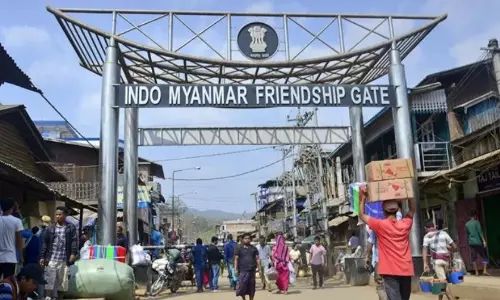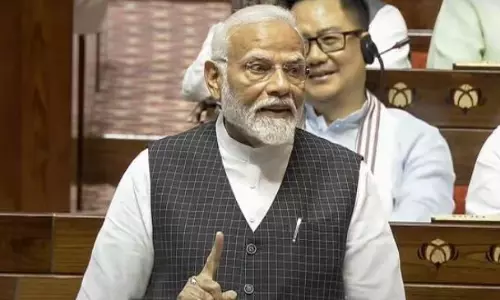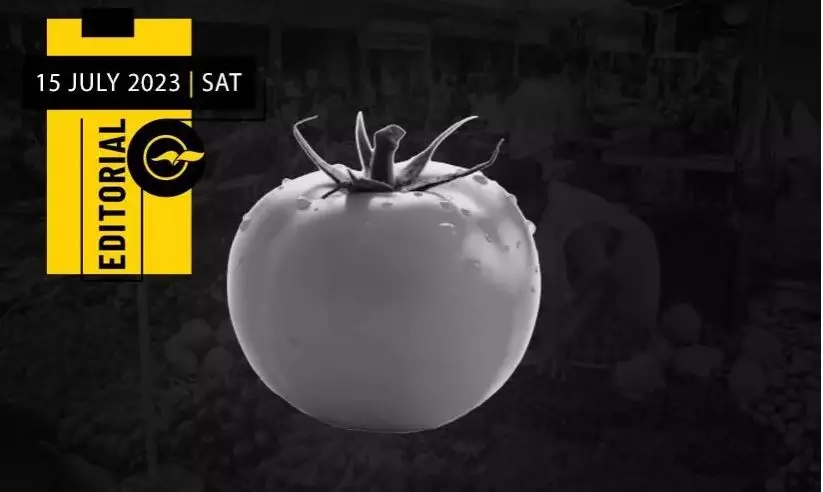
Price rise: Govt should intervene urgently
text_fieldsThe recent surge in prices has had a severe impact on the public, particularly when it comes to the cost of vegetables and groceries. An example from last week is Sonali from Kalyan, Mumbai, who received four kilograms of tomatoes as a birthday gift from her uncle and aunt. In mid-June, tomatoes were priced at Rs 20, but they have now skyrocketed to over Rs 100 in many cities. In recent news, a vegetable seller named Ajay Fauji from Varanasi gained attention for guarding his tomatoes to prevent theft, leading to the filing of a case against three individuals, including charges of rioting. Not only tomatoes, but the prices of other essential items like spices and rice have been steadily increasing over the past few months. Economic experts predict that these high prices will persist in the coming months. The Union Consumer Affairs Ministry, along with Secretary Rohit Kumar Singh, are exploring strategies to reduce the cost of food items, recognizing the challenge of controlling prices without the effective intervention of authorities. Amidst this situation, where price control seems unattainable, the common man is left helpless and frustrated by online gimmicks employed by authorities. These gimmicks only serve to mock the ordinary citizens who are struggling to afford essential commodities, which further exacerbates the hardship faced by families at the dinner table.
The price of agricultural products heavily depends on weather conditions, and unexpected changes in weather patterns during the crop cultivation and harvesting periods are having significant impacts on India's agricultural sector. However, it is important to note that attributing the uncontrollable rise in prices of daily necessities, such as vegetables, fruits, dairy products, cereals, and meat, solely to climate change would be an oversimplification. While climate change does play a role, a significant portion of price hikes in the country can be attributed to fierce market competition and hoarding practices by monopolistic companies. Blaming monopolies for the soaring prices is essential, as they engage in hoarding tactics that consistently drive prices to unbearable levels, even when farmers are not receiving fair prices for their produce. The governments, often involved in brokering these monopolies, display little interest in regulating them. It is worth recalling that Maharashtra, where Sonali received tomatoes as a birthday gift, was also the site of tomato farmers protesting last year by throwing their produce on the roads due to insufficient prices.
Farmers are being compelled to change their crops due to the ongoing price volatility in agricultural commodities. Recent reports indicate that tomato growers in Karnataka's Kolar district, who cultivated tomatoes last year, have now shifted to growing beans.
Farmers in Kerala are still awaiting payment of 400 crores for the paddy they supplied through SupplyCo, while the state government itself owes SupplyCo Rs 1130 crore for paddy threshing and public distribution. The lack of concern for farmers is more pronounced at the national level compared to the state level. The irresponsible policies and approaches of the government have not only led to a severe crisis in the agricultural sector but have also created alarming circumstances regarding price control and food procurement. It is essential to acknowledge the astute warning that this situation could potentially result in economic shocks and social unrest.
Both the central and state governments are engaged in a blame game and neglecting their responsibility to effectively intervene and control the rising prices. It is imperative that the State Government takes necessary actions by providing instructions to entities like Supply Co. and Consumer Fed to curb price escalation. Additionally, agencies such as Horticorp should be encouraged to efficiently manage vegetable storage and distribution. Collaborative efforts with other states, such as Andhra Pradesh, to lower the price of rice should also be streamlined. Failure to promptly address the price surge and implement measures to alleviate the burden on the public will result in severe hardships for ordinary citizens. The consequences of such inaction are currently unpredictable.























